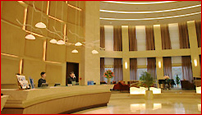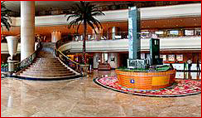| Chongqing Holiday Inn and Marriott |

Holiday Inn, Chongqing    

JW Marriott Hotel Chongqing
    
|
|
Chongqing and Dazu 4 days 3 nights Tour
About Dazu Grottoes Tour
Dazu Grottoes is situated 105 miles west
of downtown Chongqing. The Dazu Grottoes are another outstanding
example of later Chinese grotto art. There are more than 100 cliff
carvings containing 60,000 sculptures spread over 76 different places,
all mainly related to Buddhism. The content and craftsmanship of these
carvings are best at the Beishan and Baoding hills. The art of Dazu
that emerged in the late Tang Dynasty (618- 907) and flourished in the
Song Dynasty (960-1127) represents an important chapter in China's
cultural and religious history.
Highlights:
• Allow yourself to be awed by the famed rock carvings at Dazu,
a UNESCO World Heritage site and a masterpiece of Chinese
craftsmanship and culture
• As the fastest growing city in the world, find out what makes
Chongqing one of the world’s great metropolises
• Pick-up and drop-off from the airport is included in the price
of this tour
B=(Breakfast) L=(lunch) D=(dinner) DEPARTURE: Daily
|
|
| |
TOUR ITINERARY |
 |
Tour
code:
GWAC-CQ-02 |
|
| DAY 01 |
Arrive in Chongqing
You will fly into the Chongqing airport, and
upon arrival you’ll be met by your travel guide,
who will then take you to your hotel. This huge
city, both in terms of land size and total
population, is near the end of the navigable
part of the Yangtze River for large ships. It
was a part of Sichuan Province, but it was made
a “municipality” in 1997. In China, a
municipality is a big city with a big territory.
Chongqing is one of four municipalities in the
country. It is a city with a long history, and
it was important as an inland port near the rich
Sichuan region. Traders came to Chongqing
overland and by river. It is located at the
place where the Jialing River meets the Yangtze
River.
After you unpack your things, the rest of the
night can be spent at your discretion. You might
want to pay a visit to the nearby Pipa mountain,
where after a short climb you will be treated to
a bird’s eye view of the city, which is even
more incredible at night, with neon and lights
that fill up the sky.
|
|
3 or 4 star for common; 5 star for deluxe |
|
| DAY 02 |
Chongqing (B, L)
Following breakfast in the hotel we’ll get
started with a visit to the Stillwell Musem.
This former house was once used by the National
Government as the house for distinguished
guests. After General Joseph W. Stilwell's
arrival in Chongqing on March 4, 1942, the place
was made his headquarters and residence. Every
time when he came to Chongqing during his
two-year-and-eight-month service in China
Theatre, the general lived here and conducted
military conferences, held press meeting and met
Chinese and foreign visitors.
The house was reconstructed and used be the
government after 1949. It was turned into the
Gen. Stillwell museum in 1991 by the Chongqing
People's Municipal government. On display in the
museum is an extensive display of mostly
US-supplied photos, documents, articles and
video.
After our time at the Stillwell Museum you’ll
learn a little bit more about the history of
Chongqing at the Chongqing (also known as the
Three Gorges) Museum. The museum has four big
themes: “The Splendid Three Gorges,” “The Very
Ancient Ba Yu,” “The Urban Development of
Chongqing,” and “The Anti-Japanese Days.” There
are displays of antique art. There is a large
model of the entire dam project, and information
is presented about this impressive engineering
achievement. There are also films shown about
the bombing of Chongqing during WWII by Japanese
planes and about the natural scenery in the
Three Gorges area before the construction of the
dam.
One of the reasons the building was built was to
house the relics from the sites destroyed by the
construction of the 3 Gorges Dam. So you’ll find
displays of saved artifacts from sites all over
the huge submerged area. The shape of the
building itself is like that of a large dam.
There is a blue sunscreen in front that may
represent the water of the Yangtze River or the
lake itself held by the dam.
There are also dinosaur skeletons on display
that are from nearby Zigong in Sichuan Province
and places around there. The Dashanpu dinosaur
fossil site in Zigong held numerous fossil
skeletons.
To cap off our touring for the day we’ll take a
stroll through the iconic village of Ciqikou.
It was once was a prominent market and trade
town next to Chongqing. In the Ming Dynasty, it
was a river port and market town. Goods were
transported over land and water. Some buildings
have been renovated and preserved. Along the
streets are shops for porcelain and other items
and many restaurants and snack shops. So while
you are shopping, you can eat and drink
beverages at the same time. Some of the
teahouses have performances of traditional
Chinese music. It is a place to see more of how
Chongqing used to be, eat and shop.
Afterward, you can spend the rest of the evening
at your own discretion.
|
|
3 or 4 star for common; 5 star for deluxe |
|
| DAY 03 |
Chongqing-Dazu-Chongqing (B, L)
After breakfast we will make the 105 mile drive
to the county of Dazu in order to visit the
world famous Dazu Grottoes. The Dazu Rock
Carving was first excavated at the beginning of
the Yonghui time of the Tang Dynasty.
Experiencing the late Tang Dynasty and the Five
Dynasties, it was very popular in the Southern
Song and Northern Song Dynasties (A.D.960-1278).
In the Ming and Qing Dynasties, more statues
were carved. Finally, a large rock-carving
group, which gathered the pith of China's rock
carvings, was formed. It's equally famous with
the Yungang Grotto, the Longmen Grotto and the
Duhuang Grotto. It's hailed as the "Magic Pearl
of Oriental Art" home and abroad.
Dazu is the home of Chinese rock carving, with
more than 40 rock carvings and over 50,000
statues. Among them, two rock carvings, which
are the most famous and on the biggest scale,
are Baodingshan and Beishan. There are nearly
10,000 stone statues in Beishan. They mainly
gather in Fowan, which is a U-shaped section of
about 500 meters long and looks like a new moon.
These rock carvings here were excavated in the
Jingfu time of the Song Dynasty (A.D.892). The
carvings have been continuously worked during
the Five Dynasties, the Southern Song Dynasty
and the Northern Song Dynast, and it took over
250 years until it was finally completed. These
statues are lifelike and excavated elaborately.
The most wonderful statues are several statues
of Guan Yin, Wen Shu and Pu Xian. The rock
carvings in Baoshishan are rare in the grotto
art in China.
We will drive back to Chongqing in the late
afternoon, and you will have the rest of the
night to spend at your own leisure. You might
want to sample some of the local food, which is
part of the Sichuan family of spicy cuisine. The
most popular choice of course, is hot pot. A
booming business all-year-round, hot pot is a
thriving local tradition in Chongqing. Come
nightfall, hot pot restaurants and numerous
sidewalk stands open for business. Adorned with
strand after strand of colorful lights, hot pot
businesses come in all different shapes and
sizes. You will find that some are small,
intimate shops, while others consist of only a
few tables with umbrella covering for an
alfresco dining experience. You can find these
hot pot spots easily on many lanes and streets.
On average, a hot pot dinner should cost no more
than 20 rmb per person.
|
|
3 or 4 star for common; 5 star for deluxe |
|
| DAY 04 |
Chongqing-depart (B)
After breakfast in the hotel you will be taken
to the Chongqing airport, where you will fly on
to your next destination. |
|
|
|
|
Note:
Currency change rate:
1 US$ ≈6.8 yuan (RMB)
Tour Inclusions:
1. Hotels with daily western
breakfasts;
2. Meals in accordance with
that listed on the itinerary.
3. professional local guide
& driver;
4. Private air-conditioned
car or van for transportation;
5. Admission of the first
gate.
6.Two bottles of mineral
water per day.
Tour exclusions:
1. Tip of the guide
2. Personal costs
|
|

